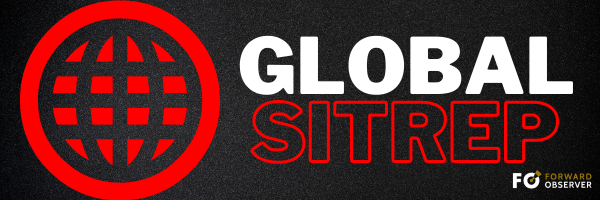Good morning, and welcome to the Global Situation Report for Friday, 19 May 2023.
THE WHAT: The Global SITREP is a free daily email briefing about geopolitics and defense from Forward Observer.
THE WHY: We want to share five important global developments shaping Cold War 2.0.
BOTTOM LINE: We’re sending out this email Monday through Friday on a trial basis through the end of the month, so be sure to let us know if you want it continued. Thank you! – M.S.
- FIRST UP: China woos Central Asia away from Russia
- Chinese President Xi Jinping attended the China-Central Asia Summit where he pitched Central Asian leaders on Chinese alignment. Xi also promised increased investment and security cooperation.
- Xi met with the leaders of Kazakhstan, Kyrgyzstan, Tajikistan, Turkmenistan, and Uzbekistan and expressed the risk of their dependence on a pre-occupied and weakened Russia.
- Kazakhstan, a member of the Collective Security Treaty Organization (CSTO), Russia’s equivalent to NATO, pledged their “full-scale cooperation” with China.
Why It Matters: China is trying to pull Central Asian states into its sphere of influence and boost regional trade to insulate itself from potential Western sanctions. Xi’s message is blunt and clear: China is the senior leader in the “no limits” alliance with Russia.
- PRIORITIES: China, Russia central focus in G7 Summit
- World leaders from the United States, Canada, France, Germany, Italy, Japan, and the United Kingdom are meeting to discuss economic and security cooperation, primarily against China. The G7 already passed a resolution calling for additional sanctions on Russia.
- Hosting Japan invited Indian Prime Minister Narendra Modi, as well as leaders from Australia, Brazil, and South Korea.
- Notably, all members of the Quadrilateral Security Dialogue are present. The Quad includes the United States, Australia, India, and Japan.
Why It Matters: The G7 quickly turned into a Quad+ meeting once Biden’s trip to Australia was canceled. This meeting will offer the Quad, plus South Korea – widely floated as potential fifth member – an opportunity to coordinate on China policy.
- PUTIN: U.S. trying to break Russia apart
- Russian President Vladimir Putin accused the U.S. and West of exploiting ethnic differences to cause internal dissension and break up the Russian Federation.
- The Russian Security Council’s Nicolai Petrushev accused the U.S. of backing the assassination of Darya Dugina, daughter of influential Putin ally Aleksandr Dugin. Petrushev also said the U.S. and the U.K. are coordinating with Ukraine to attack Russian critical infrastructure and disrupt Russian society.
Why It Matters: Russian and Chinese officials have both been preoccupied with accusations of attempted U.S.-backed color revolutions – probably for good reason. Regardless of veracity, these beliefs could lead to increased volume and intensity of Russian and Chinese information operations directed towards the American public.
- RBC: Israel-Iran war risk “very serious”
- Royal Bank of Canada analysts warned of a “very serious chance” that Israel will strike Iranian nuclear facilities if Iran moves ahead with nuclear weapon capability.
- RBC’s latest oil update focuses on the “tumultuous crescendo” of disruption to the oil trade and spiking oil prices.
Why It Matters: Israel continues to pledge military action if Iran crosses the nuclear weapons threshold. An Israel-Iran war would probably affect oil markets in a similar way that the Russia-Ukraine war impacted the global food and commodities supply.
- CONCERNS: U.S. warns Mozambique over Russian ship port call
- U.S. officials expressed their “concerns” to the government of Mozambique after its Beira port hosted a sanctioned Russian ship.
- That ship was involved in an alleged arms transfer from South Africa to Russia, according to U.S. intelligence, and reportedly turned off its transponder for four days while transiting South Africa in January of this year.
- It made port calls in Mozambique and Sudan before traveling back to Russia.
Why It Matters: While the threat of secondary sanctions has steered some countries away from cooperation with the Russia war effort, it’s also causing additional distress among countries subjected to U.S. terms on what ships can and can’t make port calls.
THAT’S A WRAP: This does it for today’s edition. If you want us to keep going, let us know in the comments or via email. And sign up below to receive this report in your inbox each day, Monday through Friday.


I am liking this. Its informative, concise, and the analysis really finishes it off.
Just discovered the daily SITREPS today and enjoy them. Please continue with them.